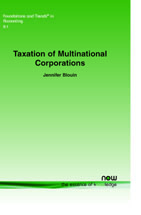Taxation of Multinational Corporations
By Jennifer Blouin, The University of Pennsylvania, USA, blouin@wharton.upenn.edu
Abstract
Multinational taxation is an area of research that encompasses academics in accounting, finance and economics. In particular, researchers are interested in determining whether taxation alters where multinational corporations (MNCs) operate their businesses. A review of the literature on foreign direct investment provides clear support for taxes influencing MNCs' location decisions. In addition, MNCs appear to organize themselves in a manner to increase the amount of their profitsinvested in relatively lightly taxed jurisdictions. By altering the location and the character of income across jurisdictions, MNCs are able to reduce their tax burdens. The natural extension of these lines of research, then, is determining the welfare consequences of MNCs' sensitivity to taxation.
This review aggregates the large body of international tax literature succinctly in one location. Very little of what is incorporated in this piece is novel. Rather, it borrows heavily from those researchers who have focused their careers on understanding taxation in the multinational context. Unfortunately, because the research in this area is dominated by work involving U.S. data, the review is also quite U.S.-centric. However, many countries' multinational tax rules are quite similar. This is primarily attributable to the conformity generated in tax treaties based on the model treaty outlined by the Organization for Economic Cooperation and Development (OECD). So, although there is variation in specific tax rules across jurisdictions, the basic tax rules are very homogeneous.
Taxation of Multinational Corporations
Multinational taxation is an area of research that encompasses academics in accounting, finance and economics. In particular, researchers are interested in determining whether taxation alters where multinational corporations (MNCs) operate their businesses. A review of the literature on foreign direct investment provides clear support for taxes influencing MNCs' location decisions. In addition, MNCs appear to organize themselves in a manner to increase the amount of their profits invested in relatively lightly taxed jurisdictions. By altering the location and the character of income across jurisdictions, MNCs are able to reduce their tax burdens. The natural extension of these lines of research, then, is determining the welfare consequences of MNCs' sensitivity to taxation.
Taxation of Multinational Corporations aggregates the large body of international tax literature succinctly in one location. Very little of what is incorporated in this piece is novel. Rather, it borrows heavily from those researchers who have focused their careers on understanding taxation in the multinational context. Unfortunately, because much of the research in this area is dominated by work involving U.S. data, the paper is also quite U.S.-centric. However, many countries' multinational tax rules are quite similar. This is primarily attributable to the conformity generated in tax treaties based on the model treaty outlined by the Organization for Economic Cooperation and Development (OECD). So, although there is variation in specific tax rules across jurisdictions, the basic tax systems are very homogeneous. Taxation of Multinational Corporations begins by outlining all of the details of taxing multinational firms (Section II). The author then discusses the theory and the related research on the role of taxation on foreign direct investment and remittances of profits into the home country (Section III). Section IV describes the incentives to undertake income shifting and/or transfer pricing. Section V addresses some of the non-tax considerations, including financial accounting, of foreign investment decisions. Current developments in the multinational tax policy are reviewed in Section VI.
